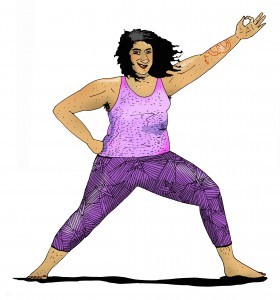Shaleah Dawnyel is one half of a team that offers a series of online eCourses and eBooks aimed at and predominantly for women running their own creative small businesses. Shaleah hails from L.A, California, and has found her way over to Berlin a few times now. The creative city of Berlin has her coming back for more.
After her short return to California, she moved to San Francisco to start up Seeing Beauty with Karina Louise, offering small business advice for women through their online resources. I’ve had the opportunity to try out several of their eCourses and they’ve helped me to figure out whether running a small business is the right thing for me, and how to do it in a way that suits me. As a freelance yoga teacher and filmmaker, the idea of running my own business was daunting and I was downright resistant to the idea of marketing. Working with Shaleah, and doing the eCourses helped me to see how I could make it work and have it fit with my own values. Here I’ve interviewed her to gain some insight on how she came up with these ideas and what she likes about working with Creatives.
What’s so great about Berlin, what draws you here?
I absolutely adore the energy in Berlin! There is a creative spirit here that I have never encountered anywhere else in the world. The pace leaves lots of room for both personal and professional exploration and the diversity and reasonable standard of living also make it primed for creating new things.
How did you get the idea to start this business? What were your motivations?
A couple years back we had an idea for a photography course for camera shy Creatives. At that point Karina and I had already been working together for over 5 years before we started Seeing Beauty. She had experienced some really transformative things while building her brand and wanted to share this experience with others. But we both knew that most people can’t afford to hire a consultant so we wanted to make what she and I had been doing to build her business practically and affordably available to more people. One eCourse became two, and the next thing we knew, we were co-founding a company. I guess you can say this idea found us!
As someone who predominantly works alone on your own consultation business, what is like for you to work with a collaborator on Seeing Beauty?
I actually never work alone as I am always collaborating with clients! My small business consultancy let’s me work with artists, makers and wellness workers to find their unique talents, leverage their resources and develop creative work that actually fits them. So many people leave nightmare jobs to create nightmare businesses! Figuring out what you really want is really the hardest part. Once you know that, the rest is just details. I help with the figuring AND the details.
But my favorite part of SB is working to collaborate with other badass biz ladies. So far we have 4 eBooks for Creatives, all developed by us and authored by experts who we asked to work with us. So many awesome people are too busy or humble to get this stuff out there. We love taking things that were sitting on the shelf, or ideas that haven’t yet come to life and making them into stuff our creative community can use.
Can you tell us a little bit about the e-courses that you offer?
Most of our products are things we have needed ourselves while building our own businesses or resources that my clients have needed along the way. At the moment this includes a Marketing Course for Creatives, US Small Biz Tax Guide, a Designer guide for Small Biz, and a Content Basics eBook. We actually just launched our new photography eCourse, the initial reason we started the company last year, and so far the reviews are awesome!
Our eCourses are highly personal and exploratory- helping people to tap into their own inner wisdom about their creative work. The eBooks are all written at the basic level to make sure the reader has a good handle on the subject. With so much non-sense out there trying to tell us what to do as entrepreneurs, we wanted to create practical resources filled with soul. I think we have succeeded so far…hopefully you agree?
I find your questions throughout the eCourses quite creative and thoughtful, they’re not the obvious ones one normally gets in questionnaires to find out “what I should do with my life.” I’m curious how you came up with these questions.
The questions come from my consultancy work. After working for over 7 years with Creatives from all over the world I have found that often asking the right questions is better than giving answers. Our work is geared around learning to hear your own voice and trusting yourself to lead your best work.
What kind of feedback have you received from those who have taken your courses?
The feedback so far has been really amazing. Like teaching anything, its insanely rewarding to see people have those “ah ha” moments where they really get something that changes their perspective and empowers them in their creative work. It’s also great to be building an actual community of dynamic, talented people who are trying to make the world a better place.
Shaleah has been an active part of the English Yoga Berlin community, attending our Hatha yoga classes and offering us consultation. We offer yoga classes in all different styles: Hatha, Vinyasa Flow, Tantric yoga, Restorative yoga and community classes.








